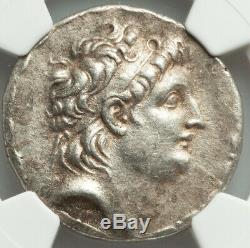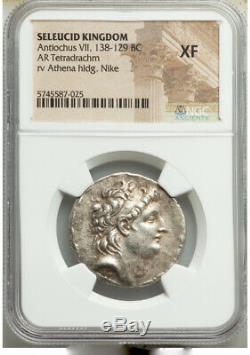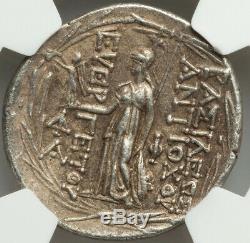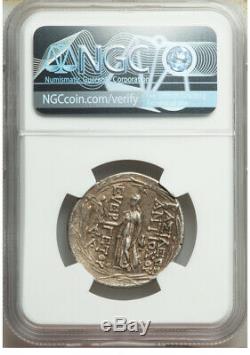
- Index
- Certification
- Composition
- Date
- 138-129 Bc (16)
- 162-150 Bc (3)
- 246-225 Bc (15)
- 281-261 Bc (3)
- 2nd Century Bc (4)
- 305-281 Bc (10)
- 322 Bc (4)
- 336 - 323 Bc (3)
- 336 Bc (4)
- 336-323 B.c. (3)
- 336-323 Bc (24)
- 3rd-2nd Centuries Bc (3)
- 404 Bc (3)
- 414 Bc (6)
- 440-404 Bc (45)
- 454-404 Bc (12)
- 4th Century Bc (4)
- Ad 70 (3)
- C. 440-04 Bc (3)
- C. 440-404 Bc (6)
- Other (2690)
- Denomination
- Era
- Year
138-129 BC Seleucid Empire Antiochus VII Euergetes Sidetes AR tetradrachm NGC XF






Authenticity of Ancient Coins Guaranteed. We do our best to make your experience perfect. H owever, I mess things up from time to time, misplace envelopes, or stuff them with the wrong coin. I always make it right for every customer at the end of the day. I'd be especially grateful to you.
Antiochus VII Euergetes (Greek:) c. 164/160 BC[1] - 129 BC, nicknamed Sidetes (Greek:) (from Side, a city in Asia Minor), also known as Antiochus the Pious, [2] was ruler of the Hellenistic Seleucid Empire who reigned from July/August 138 to 129 BC. [3] He was the last Seleucid king of any stature. After Antiochus was killed in battle, the Seleucid realm was restricted to Syria. He was one of the sons of Demetrius I Soter, the brother of Demetrius II Nicator and his mother may have been Laodice V.
Antiochus was elevated after Demetrius was captured by the Parthians. He married Cleopatra Thea, who had been the wife of Demetrius. Their offspring was Antiochus IX, who thus became both half-brother and cousin to Seleucus V and Antiochus VIII. In his nine-year reign, Antiochus made some effort to undo the massive territorial and authority losses of recent decades. Antiochus defeated the usurper Diodotus Tryphon at Dora[4] and laid siege to Jerusalem in 132 BC. During the siege he allowed a seven-day truce for the Jews to celebrate a religious festival, impressing the Jewish leadership. [5] According to Josephus[6] the Hasmonean leader John Hyrcanus opened King David's sepulchre and removed three thousand talents, which he then paid Antiochus to spare the city.Nevertheless, King Antiochus' respectful treatment of the Jews, and respect for their religion, earned him their gratitude and added name Euergetes ("the Benefactor"). With no Jewish sources of that time (the Book of Maccabees ends a few years before his time), it is unclear if the siege of Jerusalem ended with a decisive Seleucid victory or simply a peace treaty. Furthermore, Jewish forces later assisted Antiochus in his wars, and for nearly 20 years after his death, John Hyrcanus refrained from attacking areas under Seleucid control.
Later territory disputes and defeat Antiochus spent the final years of his life attempting to reclaim the lost eastern territories, overrun by the Parthians under their "Great King", Mithridates I. Marching east, with what would prove to be the last great Seleucid royal army (including a unit of Judean troops under John Hyrcanus), he defeated Mithridates in two battles, killing the aged Parthian king in the latter of these. He restored Mesopotamia, Babylonia and Media to the Seleucid empire, before dispersing his army into winter quarters.
The Seleucid king and army spent the winter feasting, hunting and drinking (the Seleucids maintained the Macedonian tradition of heavy drinking). As with any time an army is quartered upon a population, tensions soon grew between the locals and the Syrian troops. The new Parthian ruler, Phraates II, had not been idle. He raised a new army while stirring up rebellion in the Seleucid occupied towns of Media.
That winter (130129 BC), several Median towns rose in rebellion and attacked their Seleucid garrisons. Antiochus marched to support one such isolated garrison with only a small force (probably only his Royal Guards). In a barren valley, he was ambushed and killed in the Battle of Ecbatana by Phraates II and a large force of Parthians, who had entered the country without being detected. After the battle the Parthians told the people that Antiochus killed himself because of fear, but the last great Seleucid king died in battle, a fitting end for the heir of Seleucus I Nicator (the Victor). Succession Antiochus's confirmed heir was Antiochus IX Cyzicenus. But a fragment from book 16 of Posidonius' "Histories", which survives in the Deipnosophistae written by Athenaeus, mentions a king named Seleucus, who was captured in Media by king Arsaces and treated like royalty. The identity of this Seleucus have been a matter of debate; the possibility of Seleucus being a son of Antiochus VII captured after the death of his father is suggested by Felix Jacoby and, with reservations, by Ian G.The item "138-129 BC Seleucid Empire Antiochus VII Euergetes Sidetes AR tetradrachm NGC XF" is in sale since Thursday, May 28, 2020. This item is in the category "Coins & Paper Money\Coins\ Ancient\Greek (450 BC-100 AD)". The seller is "redoubt_numismatics" and is located in San Antonio, Texas.
This item can be shipped worldwide.
- Cleaned/Uncleaned: Uncleaned
- Country/Region of Manufacture: Greece
- Certification Number: 5745587-025
- Certification: NGC
- Date: 138-29BC
- Diameter: 29mm
- Die Alignment: 1h
- Grade: XF
- Year: 129 BC
- Composition: Silver
- Provenance: Ownership History Not Available
- Denomination: Tetradrachm
- KM Number: SC 2143.2

